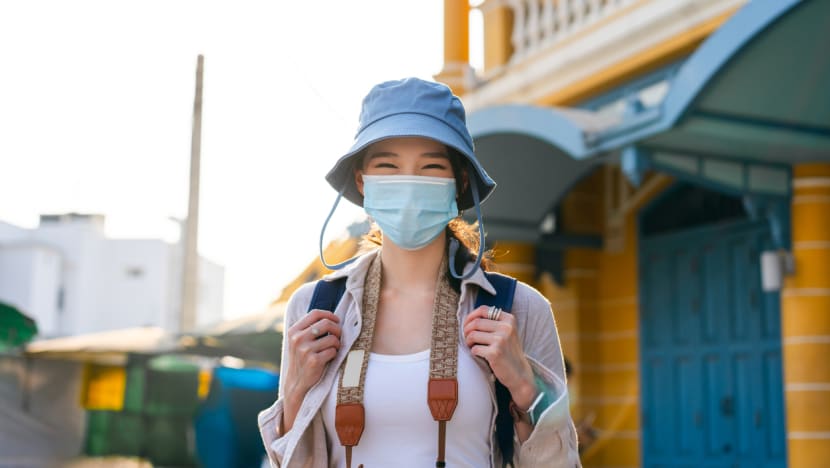Commentary: Should you still go on holiday if you have COVID-19?
Now that more countries don’t require negative tests for entry, should you go ahead with your travel plans even if you have COVID-19? This is an ethical question with not so obvious answers, says a bioethicist.

(Photo: iStock/Wiphop Sathawirawong)
PORTSMOUTH, England: Your flights are booked, your bags are packed, and in your mind you’re already sunning yourself by the beach with a cocktail.
With summer in full swing in the northern hemisphere, and most COVID-19-related restrictions behind us, travel is back on the agenda for many people. But at the same time, COVID-19 cases in the United Kingdom are rising.
So what if you’re unlucky enough to catch COVID-19 just before your long-awaited getaway? Given most countries have stopped requiring negative tests to enter, can you just go anyway?
“Obviously not – you don’t want to go and infect another country”, my 13-year-old responded when I asked him this question. But is the answer as obvious as my teenage son seems to think?
The first thing to note is that other countries may still have COVID-19 restrictions in place, so entry might be restricted altogether, or you may be prevented from travelling with COVID-19 due to testing, vaccination or quarantine rules. You can check the requirements in different countries using this map.
But assuming you’ve checked the rules for the country you’re visiting, and you’re legally allowed to travel even with COVID-19, what should you do? This is clearly an ethical question, and what seems like an obvious answer to one person might not be so obvious to others.
First, let’s look at the facts. The combination of vaccination and effective treatments for severe COVID-19 has changed the situation compared with 2020 or 2021.

The ratio of deaths to infections continues to become more favourable, and while the potential for a new, more harmful variant is an ongoing concern, the risks from COVID are becoming increasingly similar to risks faced from many other infectious diseases.
Given this, and the fact that it’s becoming harder to find a COVID test (or certainly a free one), it may be more pertinent to consider the question in relation to infectious diseases more generally.
RISKS TO YOURSELF AND OTHERS
If you’re planning to travel while knowingly ill, there would seem to be risks both to you and others. For instance, people generally don’t like the idea of being sick far from home, and buy travel insurance in the hope it will ensure they’re cared for should they become unwell (or get worse) while abroad.
But while taking out insurance shows one level of concern for health risks, these concerns are by definition quite self-centred.
Considering risks to other people, travelling with an infectious disease clearly carries the potential of passing the disease on to others. With all diseases, certain sections of the population will be more vulnerable.
So where a virus like COVID might result in only mild cold-like symptoms for you, it could be fatal for someone else.
But working out who may be vulnerable so that you can then avoid them if you’re sick is very difficult. There are also plenty of people who care for vulnerable people, and could easily pass an infection on.
Being careful and wearing a mask will help to a certain extent, but the obvious solution for protecting vulnerable people and their carers is to avoid mixing in large groups altogether.
A second health risk is the possibility of being the cause of a new, geographically distinct outbreak.
This is especially worth considering in countries with less developed healthcare systems or poorer availability of vaccines. A mild variant of a disease like COVID-19 in the UK (which has a high vaccination rate) may well be significantly more lethal in a country where a lower proportion of the population is vaccinated.
A final thing to consider is that no one has a “right” to go on holiday. Broadly speaking, “rights” are socially or legally determined, and while certainly many of us are very tired of COVID-19 and the restrictions we’ve had to endure over the past couple of years, it’s difficult to argue that this frustration means we have a “right” to travel.
Just because something is legal does not mean it is a right.
COVID-19 HAS CHANGED ATTITUDES TOWARDS HEALTH RISKS
It’s interesting to note the experience of the last couple of years – the first true pandemic in most people’s lifetime – has changed general attitudes towards infection and health risks, so that behaviour that was socially acceptable before COVID is now no longer considered appropriate.
In particular, the pandemic has increased the public’s awareness of infection control. While previously many people would have perhaps drawn a moral distinction between passing on clearly severe infectious diseases like tuberculosis or Ebola, they were often more relaxed about spreading milder diseases like influenza or the common cold.
The experience of COVID-19 has changed this as more people have come to realise infections that are mild in most people can be highly risky for some.
So should you go on holiday if you have COVID-19? I would argue that the answer to this question is similar to considering what you should do more generally if you have COVID at home, or indeed any other infection: stay away from others and treat the illness with respect.
Maybe you can achieve this if your holiday involves driving on your own, or with a small number of people you’ve previously had close contact with. Perhaps you (or your group) may also be able to stay away from others until you have recovered.
But if your intention is to fly, stay in a hotel, or visit tourist hot spots, I refer you to the comment from my 13-year-old son: “Obviously not – you don’t want to go and infect another country”.
Simon Kolstoe is Reader in Bioethics and University Ethics Advisor, University of Portsmouth. This commentary first appeared on The Conversation.














